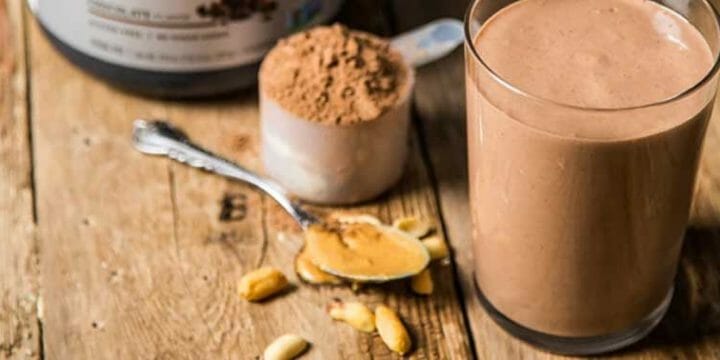As an experienced personal trainer, holistic nutritionist, and health coach, I've guided numerous clients through their weight loss journeys.
While I never actively encourage the consumption of bread, especially for those focused on shedding pounds, I acknowledge that certain types of bread offer nutritional benefits.
It's crucial to understand that not all breads are created equal. The key lies in selecting the right kind and practicing moderation.
Embracing this balanced approach allows for enjoying bread's benefits without derailing weight loss goals.
Quick Summary
- Bread could make you fat, but it depends on the type of bread you are eating and your eating habits.
- Whole grain bread is packed with nutrients such as fiber, minerals, and vitamins, which improve the overall well-being of an individual.
- Eating just two slices (120 grams) daily can lead to a 40% greater risk of obesity and weight gain
- My personal take is that bread, when chosen carefully and eaten in moderation, can comfortably fit into a healthy and balanced diet.
Does Eating Bread Result in Weight Gain?
Yes, eating bread may result in weight gain, but it heavily depends on other factors like the type of bread, bread eating habits, and your overall diet.
4 Types of Bread

On a large scale, whether the bread will make you fat depends on the type of bread you are consuming - what flour it's made of and what other ingredients, except for salt, yeast, and fats, it contains.
White Bread
Nutritional value (100 grams): 265 calories, 52g carbs, 4g fats, and 8g proteins, as per FatSecret [1].
You should avoid white bread since it's made of greatly refined (processed) wheat flour without the healthy wheat parts - bran and germ.
White wheat flour, primarily starchy endosperms, breaks down quickly in the body as simple carbohydrates, often worsened by added sugars and preservatives in white bread, making it a highly processed food choice, as noted by Medical News Today [2].
Opting for healthier bread types is a better alternative.
Whole Wheat Bread
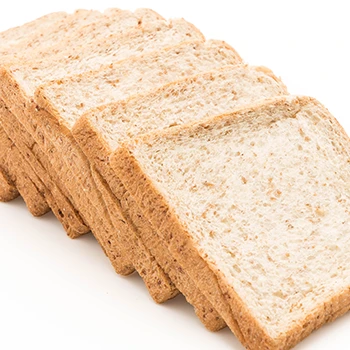
Nutritional value: 244 calories, 45g carbs, 4g fats, and 10g proteins, as per Nutritionix [3].
Based on my experience and recommendations to clients, whole wheat bread, especially nutrient-rich varieties like Ezekiel bread, is a healthier choice.
Thats because of its unrefined nature and high fiber content which aids in slower digestion and stable blood sugar levels, as supported by Harvard School of Public Health [4].
Sourdough Bread
Nutritional value: 274 calories, 51g carbs, 3g fats, and 9g proteins, as shown by FatSecret [5].
Sourdough, made through extended fermentation by bacteria and yeast, breaks down simple carbs and antinutrients, enhancing nutrient availability and digestibility, as noted by reports published by the National Library of Medicine [6].
However, its lactic acid may affect its taste and make it less pleasant compared to other breads.
Multigrain Bread
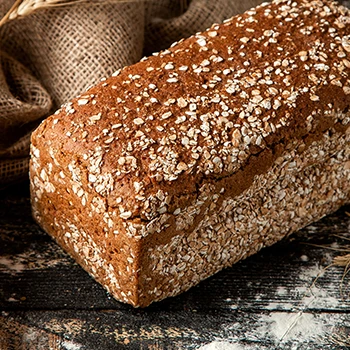
Nutritional value: 251 calories, 46g carbs, 3.8g fats, and 10g proteins,as per FatSecret [7].
Multigrain bread is rich in calories and fiber from grains like flaxseeds, millet, and oats.
It offers prolonged satiety, reducing snacking and cravings.
When consumed in moderation, presents minimal drawbacks compared to white bread.
Downsides of White Bread
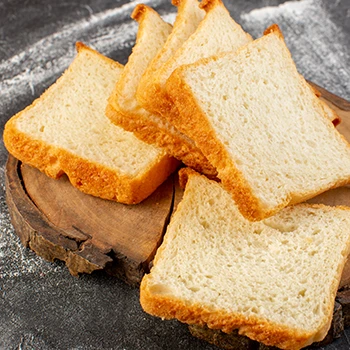
In my years of coaching, I've noticed that clients who consume a lot of white bread often struggle with energy spikes and crashes. This is because white bread is made of refined flour, which lacks the bran and is thus easier to chew but less nutritious.
Refining makes flour tastier but also will strip down all the nutritional value of wheat, providing you with empty calories, as shown by the Journal of Pharmacy and Pharmacology [8].
Refined, it doesn't contain any fiber, and it will get easily absorbed, triggering blood sugar spikes. It's the reason why white bread has low nutritional value and a high glycemic index as shown by research published in Nutrition Reviews [9].
"Just as we know there are good fats and unhealthy fats, there are good carbohydrates that are rich in fiber, and less helpful carbohydrates such as white bread, excessive intake of potato products, refined breakfast cereals, and the like."
- David Ludwig, MD, Ph.D
High glycemic foods like white bread can lead to obesity, insulin resistance, and even type 2 diabetes, as supported by a BMC Public Health study linking just two daily slices to a 40% increased obesity risk [10].
Further research by the Integrated Medicine Institute links processed and refined foods (like white bread) to increased belly fat [11].
It could also impact your mental health as shown by a study published in the National Institutes of Health which reveals a link between refined carbs consumption and depression in postmenopausal women [12].
Additionally, the environmental impact of white bread production, including water use and carbon footprint, is significant. In contrast, whole-grain bread offers beneficial effects, making it a better choice for health-conscious individuals.
Benefits of Whole Grain Bread
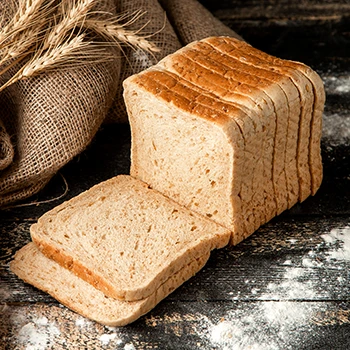
From my client experiences, whole-grain bread, rich in proteins, vitamins, minerals, and fiber, significantly boosts overall health.
It stabilizes blood sugar and may lower cholesterol levels as shown by research published by Nutrition Reviews which suggests that women who eat whole-grain products have a lower risk of cardiovascular diseases [13].
Another study by Cambridge University Press on whole grains suggests that regular eating of these products lowers the risk of developing type 2 diabetes by 30%, while in postmenopausal women, the risk was even lower - 43% [14].
Its high fiber content aids in weight management, improves digestion, and may protect against colorectal cancer.
Advances in bread making, including alternative flours and functional ingredients, further enhance its nutritional value, making it a vital part of a healthy diet, though label reading is essential to avoid additives.
How to Make Bread Part of Your Balanced Diet?
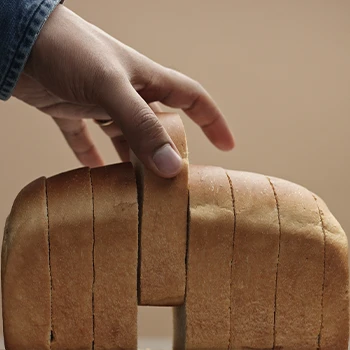
In my holistic nutrition practice, I advise clients to enjoy whole grain, high-fiber bread in moderation.
While nutritious, overconsumption can lead to weight gain. It's crucial to balance bread intake with other foods, avoiding it as a frequent side dish, especially with starchy meals.
I recommend pairing bread with healthy fats or proteins, like nut butter, cheese, avocado, or lean meat, for a well-rounded meal.
This approach helps maintain a balanced diet and supports essential nutrient intake without contributing to weight gain.
Related: Best Protein Powder For Baking
FAQs
Is It Ok To Eat Bread Every Day?
Yes, it is ok to eat bread every day as long as you choose bread made of whole grain flour and consume it in moderation.
On the other hand, no matter how attractive buttery bread straight out of the oven is, everyday usage of that high-simple-carbohydrates bread variety would probably make you gain weight quickly and eventually lead to an increased risk of diabetes and heart disease.
What Happens if You Stop Eating Bread for a Month?
If you stop eating bread for a month, you will probably notice some weight loss as a consequence of a decrease in the number of calories and water-binding carbohydrates intake that will further release stored water inside the body.
However, what this will happen and what results will greatly depend on your previous bread-eating habits and total carbs diet.
How Many Slices of Whole Wheat Bread a Day to Lose Weight?
To lose weight, you should opt for eight slices of whole wheat bread a day. However, this number varies according to your calorie intake throughout the day.
If you want to maintain your current weight, you should eat up to 12 slices, whereas if you consume bread to make you gain weight, the weight gain occurs when the number goes above 15 slices per day.
What Are the Benefits of Fermented Foods?
The benefits of fermented foods are improved digestion and gut health, enhanced nutrient absorption, a boost to the immune system, reduced sugar content in foods, natural food preservation, and potential mental health benefits due to the gut-brain connection.
References:
- https://www.fatsecret.com/calories-nutrition/usda/white-bread
- https://www.medicalnewstoday.com/articles/325171
- https://www.nutritionix.com/food/whole-wheat-bread/100-g
- https://www.hsph.harvard.edu/nutritionsource/carbohydrates/fiber/
- https://www.fatsecret.com/calories-nutrition/generic/bread-sour-dough
- https://pubmed.ncbi.nlm.nih.gov/11368651/
- https://www.fatsecret.com/calories-nutrition/generic/bread-multigrain
- https://www.researchgate.net/publication/321342781_Bread_and_Health
- https://academic.oup.com/nutritionreviews/article/58/6/163/1838374
- https://bmcpublichealth.biomedcentral.com/articles/10.1186/1471-2458-14-1091
- https://www.imi.com.hk/how-to-lose-belly-fat.html
- https://www.ncbi.nlm.nih.gov/pmc/articles/PMC4515860/
- https://academic.oup.com/nutritionreviews/article/70/4/218/1937101
- https://www.cambridge.org/core/journals/proceedings-of-the-nutrition-society/article/epidemiological-support-for-the-protection-of-whole-grains-against-diabetes/0CF1654EED8AD205BDCF28215DD032FE
About The Author
You May Also Like


